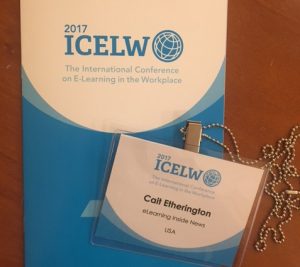
Articles
Editor’s Picks
Highlights from the First Day of the ICELW Conference
By Cait Etherington
June 14, 2017
June 14, 2017 – Dr. David Guralnick of Kaleidoscope Learning opened the 2017 International Conference on E-Learning in the Workplace (ICELW) this afternoon. Guralnick, who founded ICELW a decade ago, emphasized e-learning’s rapid growth but further emphasized that moving forward, it will be critical to keep asking questions about best practices. In many respects, this is precisely what happened on the first day of the ICELW Conference. Presentations emphasized both how dynamic the online learning field has become in recent years and the need for ongoing research and development.
Opening Remarks
 Now in its 10th year, ICELW is truly international in scope. This year the conference includes presentations from participants hailing from 16 countries, including Canada, Belgium, Switzerland, the United Kingdom, Brazil, and Argentina. The conference program also reflects a unique mix of representatives from industry and higher education. As a result, ICELW is a rare opportunity for eLearning experts from around the world and across sectors to share best practices.
Now in its 10th year, ICELW is truly international in scope. This year the conference includes presentations from participants hailing from 16 countries, including Canada, Belgium, Switzerland, the United Kingdom, Brazil, and Argentina. The conference program also reflects a unique mix of representatives from industry and higher education. As a result, ICELW is a rare opportunity for eLearning experts from around the world and across sectors to share best practices.
As Guralnick emphasized in his opening remarks, despite eLearning’s huge leaps and bounds over the past two decades, however, there is still more work to be done: “We still see a lot of learning online that is still very rudimentary–eLearning that asks you to read something and take a quiz, but technology keeps improving, and this means we can build educational experiences that are very different than those we were building in the past. This conference is about exploring how can we take advantage of what is coming up and not simply repeating what has already been done. This is at the heart of the conference and why we are still here ten years later, coming together as researchers to keep pushing forward.”
Keynote by Dr. Alicia Sanchez
In the opening keynote, Alicia Sanchez, who designs games for the Defense Acquisition University explored why it is important to keep games relevant and accessible.If you’re producing a game for the workplace, for example, she notes that it is wise to avoid using uniforms that are overly realistic (such details can distract players if and when the uniforms change in real life). Her comments are notable since she produces games for the military. Still, she doesn’t overlook the value of fantasy in her game development.
Panels on the First day of the ICELW Conference
 Following Sanchez’s keynote, two parallel panels took place. The first session chaired by Fernando Salvetti (Logosnet, Switzerland) included presentations on emotion and eLearning by conference chair David Guralnick, as well as presentations on the use of eduBeacons in workplace training (Patrick Blum, inside Business Group, Germany) and learning ecosystems (Gina Richter, Conduent, New York, USA). At the same time, another group gathered to listen to presentations on problem-based learning (Gail Radecki, Executive Director, Inc., Milwaukee, USA), online delivery methods (Stuart Simmons and Melissa Dobson, Northern Alberta Institute of Technology, Canada), and data envelopment analysis (DEA) (Jean Claud Callens, VIVES University College, Belgium). The second panel was chaired by Keyonda Smith of the Maryland University of Integrative Health.
Following Sanchez’s keynote, two parallel panels took place. The first session chaired by Fernando Salvetti (Logosnet, Switzerland) included presentations on emotion and eLearning by conference chair David Guralnick, as well as presentations on the use of eduBeacons in workplace training (Patrick Blum, inside Business Group, Germany) and learning ecosystems (Gina Richter, Conduent, New York, USA). At the same time, another group gathered to listen to presentations on problem-based learning (Gail Radecki, Executive Director, Inc., Milwaukee, USA), online delivery methods (Stuart Simmons and Melissa Dobson, Northern Alberta Institute of Technology, Canada), and data envelopment analysis (DEA) (Jean Claud Callens, VIVES University College, Belgium). The second panel was chaired by Keyonda Smith of the Maryland University of Integrative Health.
The first day of the conference ended with a reception in the Ivy Lounge at Columbia University’s Faculty House where conversations about the day’s proceedings and the future of the eLearning continued to take place well into the evening.









No Comments